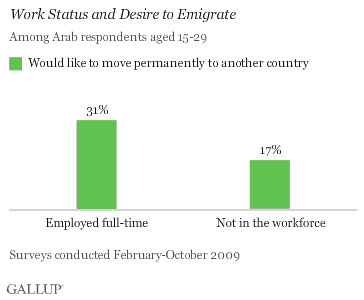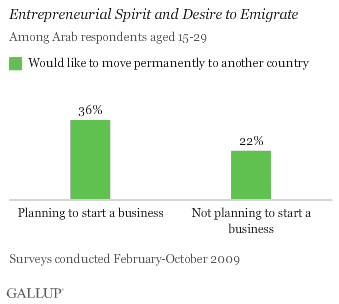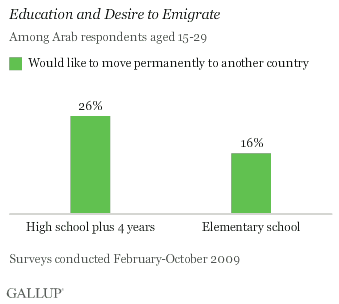WASHINGTON, D.C. -- Young Arabs who have a job are more likely than those who do not to express the desire to emigrate permanently. Across Arab League member countries surveyed, 31% of respondents who already work full time compared with 17% who are not in the workforce say they would like to leave their country permanently, if they had the opportunity. The findings are based on Gallup's latest report, "The Silatech Index: Voices of Young Arabs," which explores young Arabs perceptions toward job creation and the business climate in their countries.

The "Silatech Index" report, prepared in partnership between Gallup and Silatech, is the second in an ongoing series, providing new and important data that can shed light on potential levers of job creation and entrepreneurship across Arab countries. The findings reveal that respondents who say they have plans to launch a business in the next 12 months are more likely than those without entrepreneurial aspirations to express the desire to leave their country permanently. Further, respondents who have a high school degree plus four years of education (compared with those with an elementary education level) are also more likely to say they would like to emigrate. The findings suggest that a country's greatest assets, at least among countries surveyed, are its most mobile, underscoring the potential effects of brain drain in the region.
Based on certain demographic characteristics among Arab youth who would like to emigrate, three top desired destinations emerge. Among aspiring entrepreneurs, the United States would be their destination of choice. Among respondents who have a high school degree plus four years of education, their top country is the United Arab Emirates, while for those who have an elementary school education, France is their No.1 desired destination.


Some observers are quick to assume that unemployment, especially among young people, is what prompts them to leave their countries. However, the report findings suggest that while a dearth of jobs may be a factor in young people's desire to emigrate, others may be at play. A lack of opportunities (or at least the perception of it) or unfulfilled aspirations may also contribute to young people's desire to seek a better future away from their home countries.
Other key findings from the report underscore the importance of human development, good governance, security, community trust, and technology as levers of job creation and entrepreneurship in countries surveyed.
The "Silatech Index" report puts young people at the core of the job creation initiative. As such, it ensures that voices of young Arabs represent the bedrock of policies and interventions that will be implemented to confront the job creation challenge in the region.
Read the complete report.
For complete data sets or custom research from the more than 150 countries Gallup continually surveys, please contact worldpollpartners@gallup.com or call 202.715.3030.
Survey Methods
Results are based on more than 16,000 face-to-face interviews with Arab nationals, aged 15 to 29, conducted between February 2009 and October 2009. A minimum of 568 interviews were conducted in each of the following countries and areas: Algeria, Bahrain, Comoros, Djibouti, Egypt, Iraq, Jordan, Kuwait, Lebanon, Libya, Mauritania, Morocco, the Palestinian Territories, Qatar, Saudi Arabia, Somalia (Somaliland region), Sudan, Syria, Tunisia, the United Arab Emirates, and Yemen. The margin of error for percentages reported in this article is ±3 percentage points or lower. In addition to sampling error, question wording and practical difficulties in conducting surveys can introduce error or bias into the findings of public opinion polls.
